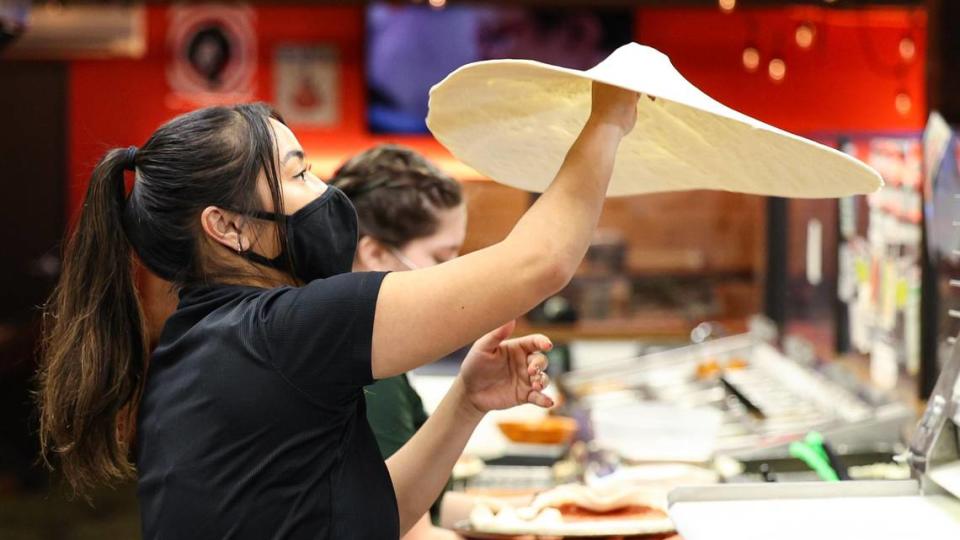Why is your favorite SLO County restaurant closed on a Tuesday? Probably not enough staff
Editor’s note: This is the first in an ongoing series examining the impacts of the labor shortage in San Luis Obispo County. If you are a business owner or a worker impacted by the shortage who wants to share your experiences, please email reporter Kaytlyn Leslie at kleslie@thetribunenews.com.
When Joanna Wemple and her husband Shayne got the final piece for the pizza oven they had been waiting to install since July, they thought they finally had everything they needed to launch the wood-fired pizza expansion of their Atascadero restaurant, Colony Market and Deli.
Turns out, they still were missing something — something they haven’t been able to find yet: workers.
In early January, Wemple started serving wood-fired pizza at her El Camino Real restaurant in addition to the sandwiches, salads and appetizers they had been selling before.
But that new menu item came at a cost.
“So we’ve finally gotten open, but we don’t have enough people to serve (the pizza),” Wemple told The Tribune in an interview Tuesday. “We used to be open seven days a week from 10 am. to 3 p.m. and we were trying to be open until 8 p.m. — that’s not possible (with current staffing). So we had to decide.”
Instead, Wemple chose to close on Tuesdays and Wednesday indefinitely to be able to move staff around and cover the later hours the rest of the week.
“We didn’t build the oven to do that,” Wemple said. “And we’re like, ‘OK, well, we’re pushing forward,’ but it’s kind of crazy.”
Wemple is not alone.
Almost a dozen other San Luis Obispo County restaurants told The Tribune they were having similar problems finding staff for their businesses amid a national labor shortage.
From smaller mom-and-pop establishments like Colony Market and Deli to big names like Woodstock’s Pizza in San Luis Obispo, virtually all types of local restaurants are having trouble finding workers.
The potential reasons behind the national shortage are many, ranging from an exodus of Baby Boomers retiring during the pandemic to record numbers of workers quitting their jobs last year.
But economic experts say the seeming decline in the number of workers willing to take jobs in the service industry is potentially linked more to historically low wages in those jobs, poor working conditions, as well as concerns about front-line exposure during an enduring pandemic.

This has led to an uptick in restaurants increasing their starting pay or adding benefits to try to attract more candidates.
Though it is unclear exactly how long the difficulties in hiring workers may last, local restaurants are feeling the sting, responding with significantly cut back hours and eyeing an uncertain future.
“We celebrated our one-year anniversary during the shutdown,” Wemple said. “We’ve never had, like, what you would call a normal operation. ... We are just trying to like make it work, trying to feel normal and keep moving forward with our business plan and all of that and now I’m like, ‘Gosh, OK, how long is this going to go on?’”

SLO County restaurant owners ask: Where are the applicants?
When he starts the day at San Luis Obispo Asian fusion restaurant Oki Momo, co-owner and current manager Jon Yeh said he’s usually still pretty optimistic about the state of the industry.
But after a double shift taking orders in the morning because one of their too-few cashiers is out with a cold and cooking in the afternoon and evening to fill in for a chef who is out with a long-term injury — he’s not so sure how much longer he can hold on.
“It’s just everything is a crisis, every day,” he said.
Yeh said he began noticing last year that his restaurant’s job postings were going unfilled for longer amounts of time.
“I’d say before — about nine months ago — whenever I’d put an ad out, if it was an ad for a cashier, I’d usually have it filled by that morning,” he said. “I’d put it out at 9 a.m., by noon I’d have like 10 applicants. It’d be fine.”
Wait times might be longer for skilled positions like cooks, he said, but there was never a problem finding someone who was willing to work.
Now, he said he’ll have postings where he’ll get only a handful of applicants.
For example: Yeh recently hired a 75-year-old man to be a dishwasher because he was literally the only applicant.
“He tries so hard to help as much as he can — he’s so sweet and he’s great,” Yeh said. “But he’s 75 years old. Dishwashing is a young man’s game.”

Wemple has had similar problems with a lack of people responding to her Atascadero restaurant’s job postings.
“We could put out an ad to try to find employees,” Wemple said. “You don’t even get any responses. Like, you put out an ad for a cook, let’s say, and it’s crickets.”
To adequately staff her restaurant, Wemple said she’d likely need at least two more chefs and several more support staff.
But she just hasn’t been able to find them.
“There’s no feeling for when — or if — people are going to return to the workforce,” she said. “I can’t seem to put my finger on the pulse of that. Like what the actual sentiment is: Is this the new normal? I don’t know. I hope not. Because as a restaurant, we need to be open.”

Inflation, supply chain problems stress short-staffed restaurants
In the meantime other factors are also threatening the viability of local restaurants.
Yeh said thanks to inflation, his costs at Oki Momo have gone through the roof.
A case of latex gloves that was once $20 costs $75 now, he said. A crate of to-go boxes costs $90 when they used to cost $30. And the flank steak Yeh serves? It costs three times as much as it did per pound pre-pandemic, he said.
To cope with that, he had to raise his prices by 5% — a move that angered some customers.
He’s also struggling with supply chain issues that leave him without critical ingredients almost every week — just last week he ran out of teriyaki sauce because an order didn’t come in and he had to “cobble together” a replacement with a recipe he found online.
All of this is leaving Yeh at his wits’ end, and making him question how much longer he can keep the restaurant open.
“What can I do?” he said. “So it’s all this work. And I’m actually paying for the privilege to do all this work, because we’re not profitable at this point because of the inflation and all this, and I can’t raise my prices quick enough. ... I can just be sitting at home and losing less money.”
He added: “Why am I doing this?”
Restaurant focusing on employees to help keep morale up
The short answer for why Yeh is continuing to operate Oki Momo? He feels he has a responsibility to the restaurant and its staff to do the best he can.
“I opened it just before my youngest child, my daughter, was born,” Yeh said of the restaurant. “It’s kind of like my third child, you know?”
He’s also been committed to trying to create better working conditions for his staff than they might have in other restaurants.
“I really do feel like I’ve given them a better situation than the kind of the restaurants that I grew up working in,” he said. “It’s always been my goal to treat people better.”
Yeh recently increased the pay for cashiers, the lowest-paid employees, from $15 per hour to $18 per hour. All employees also get paid time off, he said, something that isn’t guaranteed in most restaurants.
“I want to keep it (open) for them, too,” he said “It hasn’t broken my spirit just yet.”
Woodstock’s Pizza in San Luis Obispo has also been working to create a better environment for its staff in hopes of retaining and attracting new employees.
Owner Laura Ambrose told The Tribune that the downtown eatery is down about 25 people from “what we need to ideally run the restaurant.”
This includes both larger labor shortage issues as well as a number of workers who have had to call out last-minute because they have or have been exposed to COVID-19 and must go into quarantine.
This means Woodstock’s has to cut its late-night hours entirely to try to keep staffed and is now open only until 9 p.m. where it used to be open until at least midnight every day.

“It just became a situation where we had to cut down to two shifts,” she said. “And the tactical reality it’s that honestly right now, we’re trying to keep morale up. We have to be really sensitive to our team.”
That’s difficult when tensions are already high among members of the public, Ambrose added, who sometimes take it out on the already-stressed staff.
She said she recently added a note to Woodstock’s online ordering system, asking people to be patient with delivery delays or issues with their orders.
“Honestly, I know a lot of people are kind of at wit’s end and they’re triggered by lots of what would normally be inconsequential issues,” she said. “I would just encourage people to take a breather and give people a little extra margin, because it’s a really difficult time and the last thing that our team needs is somebody, you know, complaining bitterly about something that they have zero control over, like having to wear a mask in the restaurant, or, you know, taking longer than normal to process.”
“These are just the realities right now,” she said. “Getting upset and yelling at people doesn’t really help anything.”
In the meantime, Woodstock’s is focusing on its employees and trying to build morale, Ambrose said.
It’s are also working on ways to attract new applicants, including a program that gives workers an automatic $1-per-hour raise after two to three months at the restaurant (a help-wanted sign posted on Wednesday promised a $20-per-hour starting wage). Ambrose said employees who work 30 hours or more also qualify for the health and dental plan.
Current employees are also encouraged to recruit others to work there with the promise of bonuses if someone they recommend is hired, she added.
All of this is meant to be proactive and help the restaurant escape from the difficulties of too-few workers, Ambrose said.
In the meantime, though, she urges people to remember to be patient with restaurant workers — they are trying their best with what they have.
“Nobody’s standing around ignoring the business or the order,” she said. “It’s more that when you have a really thin crew, you’re just doing the best you can to try to handle the business that comes in.”

